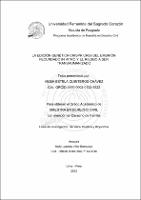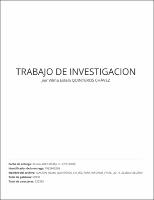| dc.contributor.advisor | Villar Barnuevo, Nelly Luzmila | |
| dc.contributor.author | Quinteros Chávez, Vilma Estela | |
| dc.date.accessioned | 2023-01-27T21:55:37Z | |
| dc.date.available | 2023-01-27T21:55:37Z | |
| dc.date.issued | 2022 | |
| dc.identifier.uri | http://hdl.handle.net/20.500.11955/1071 | |
| dc.description.abstract | El propósito de la investigación que se presenta, pretende contribuir con el conocimiento teórico desde la línea bioética y biojurídica, del riesgo que significa editar con la herramienta biotecnológica Crispr cas9 embriones humanos fecundados in vitro. Por lo que el objetivo consiste en determinar de qué manera la edición genética utilizando Crispr cas9 en el embrión fecundado in vitro, le acarrearía el riesgo a ser transhumanizado. Dicha edición o modificación, que sugieren ciertos científicos, corrientes filosóficas, empresas biotecnológicas, etc., en un futuro no tan lejano podría conducir a la transhumanización de la especie. Al respecto, en nuestro país la reproducción asistida se realiza bajo el amparo de un artículo de la ley interna de salud, el cual es muy general por lo que es preciso se norme y regule con proporcionalidad a la magnitud del riesgo que supone para el concebido por fecundación in vitro. Por ello, se analizó puntualmente parte del Texto Sustitutorio sobre la materia que, se encuentra en revisión en el Congreso nacional. Se desarrolló esta investigación con enfoque cualitativo, de nivel exploratorio, de tipo básico teórico transversal, de diseño no experimental y siendo la guía documental el instrumento utilizado. Los resultados concluyen que la hipótesis se cumple, pues se evidencia el riesgo de que la edición con Crispr cas9 en el embrión fecundado in vitro llegará hasta a transhumanizarlo. | es_PE |
| dc.description.abstract | The purpose of the research presented is to contribute to theoretical knowledge from the bioethical and biolegal line, of the risk involved in editing human embryos fertilized in vitro with the biotechnological tool Crispr cas9. Therefore, the objective is to determine how genetic editing using Crispr cas9 in the in vitro fertilized embryo would entail the risk of being transhumanized. Said edition or modification, suggested by certain scientists, biotechnological companies, legislative proposals, etc., in the not-so-distant future could lead to the transhumanization of the species. In this regard, in our country assisted reproduction is carried out under the protection of an article of the internal health law, which is very general, so it is necessary to regulate it proportionally to the magnitude of the risk it poses to the conceived by in vitro fertilization. For this reason, part of the Substitute Text on the matter was analyzed promptly, which is under review in the National Congress. This research was developed with a qualitative approach, at an exploratory level, of a basic transversal theoretical type, with a non-experimental design and the documentary guide being the instrument used. The results conclude that the hypothesis is fulfilled, since there is evidence of the risk that the edition with Crispr cas9 in the in vitro fertilized embryo will even transhumanize it. | es_PE |
| dc.description.uri | Tesis | |
| dc.format | application/pdf | es_PE |
| dc.language.iso | spa | es_PE |
| dc.publisher | Universidad Femenina del Sagrado Corazón | es_PE |
| dc.rights | info:eu-repo/semantics/openAccess | es_PE |
| dc.rights.uri | https://creativecommons.org/licenses/by-nc-nd/4.0/ | es_PE |
| dc.source | Repositorio Institucional - UNIFÉ | es_PE |
| dc.subject | Derecho--Tesis | es_PE |
| dc.subject | Ingeniería genética--Derecho y legislación | es_PE |
| dc.subject | Fecundación in vitro | es_PE |
| dc.subject | Genetic engineering-Law and legislation | en_US |
| dc.subject | Fertilization in vitro | en_US |
| dc.title | La edición genética Crispr Cas9 del embrión fecundado in vitro y el riesgo a ser transhumanizado | es_PE |
| dc.type | info:eu-repo/semantics/masterThesis | es_PE |
| thesis.degree.name | Maestra en Derecho Civil con mención en Derecho de Familia | es_PE |
| thesis.degree.grantor | Universidad Femenina del Sagrado Corazón. Escuela de Posgrado | es_PE |
| thesis.degree.level | Maestría | es_PE |
| thesis.degree.discipline | Derecho Civil con mención en Derecho de Familia | es_PE |
| dc.subject.ocde | https://purl.org/pe-repo/ocde/ford#5.05.01 | es_PE |
| renati.advisor.dni | 10551459 | |
| renati.advisor.orcid | https://orcid.org/0000-0002-7114-3338 | es_PE |
| renati.author.dni | 08615778 | |
| renati.discipline | 422067 | es_PE |
| renati.juror | Alarcón Alarcón, Rosario Guadalupe | es_PE |
| renati.juror | Posadas Gutierrez, Rose Mary | es_PE |
| renati.juror | Acosta Álvarez de Hoyle, Gloria María | es_PE |
| renati.level | http://purl.org/pe-repo/renati/level#maestro | es_PE |
| renati.type | http://purl.org/pe-repo/renati/type#tesis | es_PE |
| dc.publisher.country | PE | es_PE |
| dc.description.lineadeinvestigacion | Genética, Bioética y Biojurídica | es_PE |




